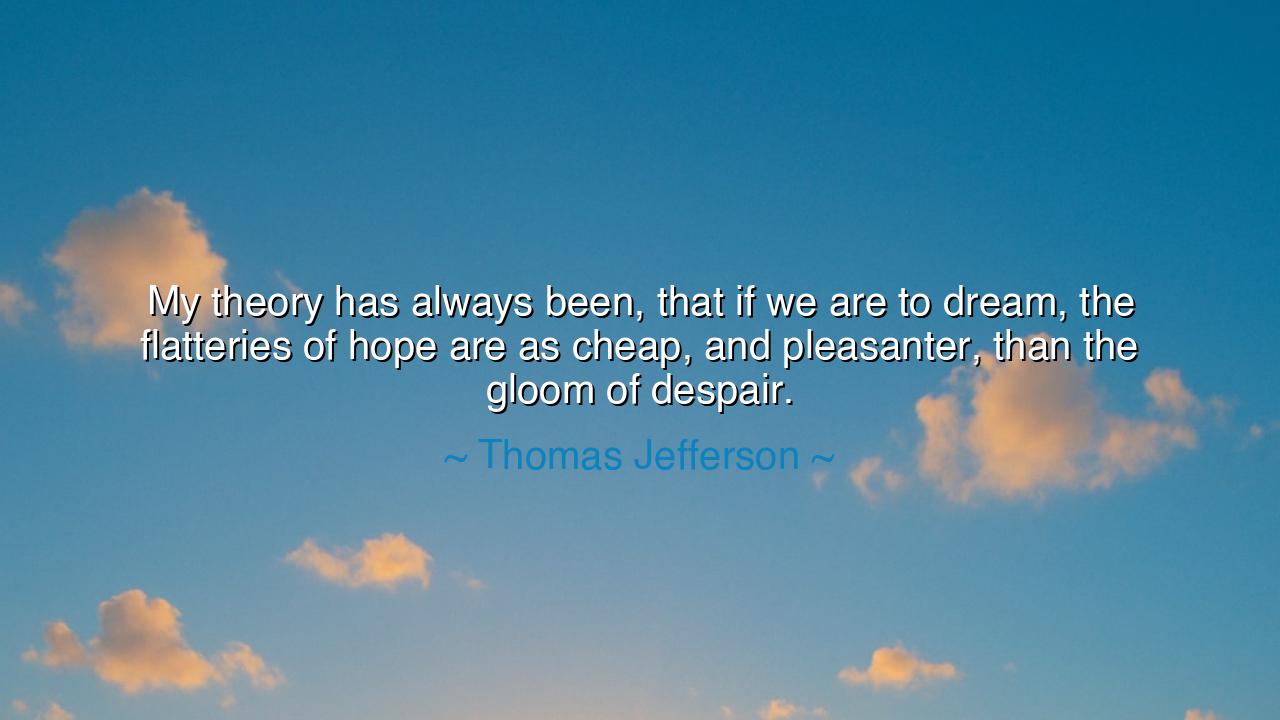
My theory has always been, that if we are to dream, the
My theory has always been, that if we are to dream, the flatteries of hope are as cheap, and pleasanter, than the gloom of despair.






Thomas Jefferson once wrote: “My theory has always been, that if we are to dream, the flatteries of hope are as cheap, and pleasanter, than the gloom of despair.” These words, gentle yet radiant with courage, speak to the eternal struggle within the human heart — the battle between hope and despair. Jefferson, a man of reason and of faith in progress, knew that the world offers no certainty but that of imperfection. Yet, he chose the light. He chose to believe that even if dreams deceive us, it is better to walk in their golden glow than to sit shivering in the cold of hopelessness. His words are not those of a naïve optimist, but of a wise soul who understood that hope, even if fragile, is the lifeblood of all endeavor.
In Jefferson’s age, the world trembled with change. He lived through the birth of a nation — a time when the air was thick with both promise and peril. The American Revolution was not a certainty but a dream — a daring vision of liberty forged in defiance of empire. In such an hour, despair would have been easier. The colonies were poor, divided, and facing the might of the greatest army on earth. Yet Jefferson, with his pen, dared to write the words that gave the people hope: “We hold these truths to be self-evident…” Those words, born from the flatteries of hope, became the foundation of a new world. Had he chosen the gloom of despair instead, there would have been no Declaration, no vision, no future. His life itself was a testament to the truth that hope is the first act of freedom.
Jefferson’s quote reminds us that the mind shapes its own heaven or hell. If one must dream, he argues, then why not dream kindly? For both hope and despair are illusions — projections of the same uncertain future — yet one heals, while the other wounds. Despair prepares us for failure, but it also blinds us to possibility. Hope, on the other hand, nourishes the heart, giving strength to strive, to act, to endure. “The flatteries of hope,” as he calls them, may sometimes deceive, but even when they fail, they leave behind courage, joy, and faith — gifts despair can never give.
Consider the life of Abraham Lincoln, a man born into hardship, who faced endless trials — poverty, political defeat, the anguish of war, and the death of his son. Yet he once said, “I am an optimist because I do not see the point in being anything else.” Like Jefferson, Lincoln understood that despair solves nothing. It only paralyzes. Hope, though uncertain, is the force that moves mountains. It is the flame that lit his path through the darkest night of the Civil War, guiding him toward emancipation and unity. His dream — that a house divided might yet stand — was built not on guarantees, but on the pleasant flatteries of hope, which proved mightier than despair’s iron logic.
Jefferson’s insight also carries the humility of a philosopher. He does not promise that hope will always triumph, or that dreams will always come true. He merely observes that hope costs nothing, yet gives so much. “As cheap, and pleasanter,” he says — a simple truth, spoken with the calm of a man who has seen both triumph and loss. Hope does not ask for certainty; it asks for the courage to believe in better days. Despair, by contrast, offers nothing but the comfort of surrender — and that, too, is an illusion, for surrender does not spare us suffering; it only denies us joy.
The ancients, too, knew this truth. The poet Hesiod wrote that when Pandora opened her jar and unleashed all the evils of the world, one gift remained: Hope. It was the gods’ mercy to mankind, the eternal remedy for sorrow. Jefferson’s words breathe the same ancient spirit — the understanding that though life is uncertain, the soul must lean toward light. Hope is not foolishness; it is faith in the unseen potential of things — the whisper of dawn before the sun breaks through.
So let this be the lesson: Choose hope deliberately. If you must dream — and dream you must, for life without dreams is death — let your dreams be guided by optimism, not fear. When the road grows dark, light the torch of hope and keep walking. Speak words that lift others; think thoughts that build, not destroy. For the future belongs not to those who predict its failure, but to those who dare to hope in its beauty.
Remember Jefferson’s wisdom: despair and hope both require imagination — but only one nourishes life. So dream boldly, even if the dream deceives. For the heart that hopes, even in the face of uncertainty, lives more fully than the one that surrenders to despair. And in the end, whether the dream succeeds or fails, the hopeful soul has already won — for it has chosen to live in light, rather than in shadow.






AAdministratorAdministrator
Welcome, honored guests. Please leave a comment, we will respond soon